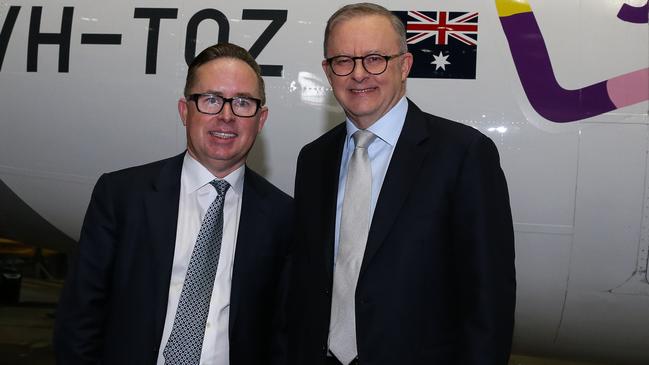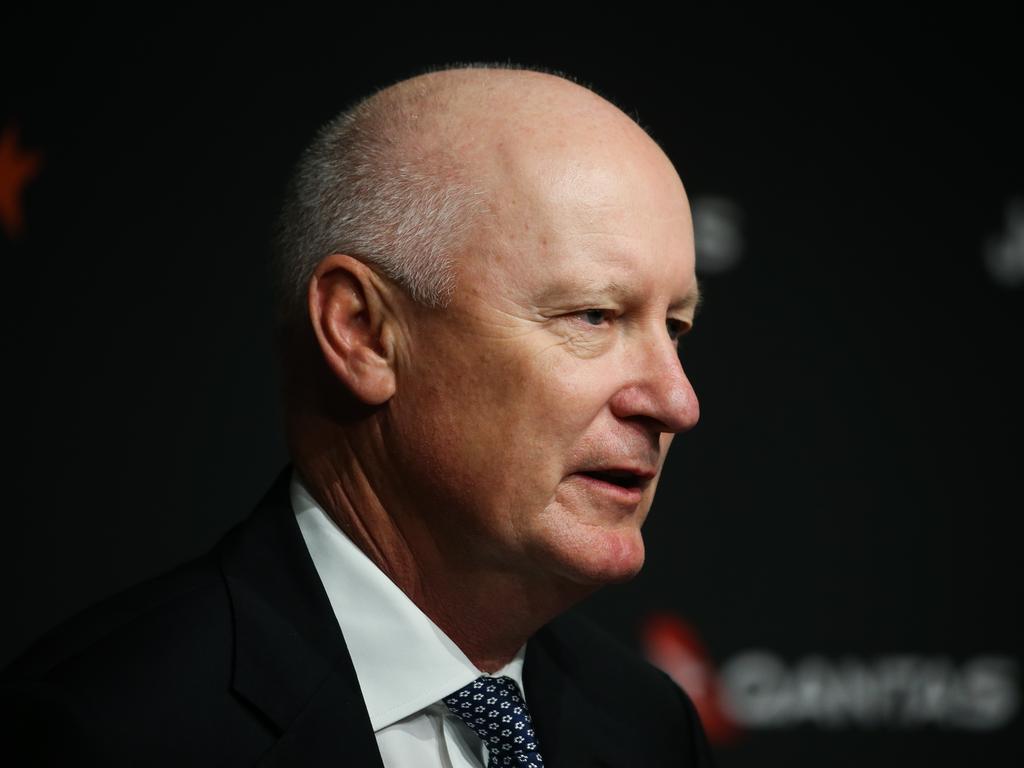
Albanese with a tin ear? How did he misread the public’s accumulated rage against Qantas? The ever sensitive Labor Party, so attuned, so conscious about cost of living, so keen to side with the public, lurched into dysfunction over Qantas. Its default mechanism was the wrong one. Somebody pulled the wrong lever and kept pulling.
Joyce has been prematurely liquidated by the Qantas board. Smart move. But Albanese is left with the wreckage. Joyce leaves but Qantas has reputational damage likely to last decades. Labor is tainted by its unnecessary support of Joyce – in terms of political and economic principle.
Joyce was always the government’s friend, Labor or Liberal. He was here to help – strengthen Qantas, deliver for shareholders, work with government to get through the pandemic, champion the voice. Aligned with Albanese on the great quest, flying the Yes23 team around the country. Joyce was more than a chief executive; he was an influencer. That’s dangerous. He promoted Qantas in his own image and values, another synergy with Albanese. The country might be split down the middle but Joyce knows what’s best for Australia. He deploys Qantas as a participant in the great campaign to change our system of government and constitutional values. Pity about the travellers he has ripped off for the past year.
Does Labor really believe its alliance with Joyce helps the voice? What has happened to Labor’s political brains? Welcoming Joyce’s political and financial support for the voice, Albanese extolled Qantas for making us a better country, for doing its bit “to lift all of us a little bit higher, both literally and figuratively”. It is beyond nauseating. Labor knocking back Qatar Airways from doubling its flights to Australia seemed a small gesture and a no-brainer. Qatar had a bad reputation with women anyway and protecting Qantas was the conventional call. Yet there was unease. Doesn’t this government believe in competition? Doesn’t it want lower airfares?
Virgin Australia chief executive Jayne Hrdlicka said the approach could have reduced international airfares by up to 40 per cent. Of course, she had a sizeable vested interest. But the public might be smart enough to figure that more flights mean lower fares – and Labor didn’t want more flights. Slight problem. But Labor had a good reason. Transport Minister Catherine King explained it was in the “national interest”. Ah, the national interest; exactly what aspect of the national interest?
Labor fumbled, it didn’t really know. The slick PR machine was in malfunction. Kick it. Nothing happened. No smooth words of reassurance. Ministers seemed utterly clueless. Finally, a message trickled out; Qantas had to be sustained. Sure, but the public understood — another Qantas protection ploy.
At first, it didn’t seem too big a deal. But on August 23 Jim Chalmers and Andrew Leigh made a grand show of Labor’s new commitment to competition policy, a review with help from high-profile figures, former Australian Competition & Consumer Commission chairman Rod Sims and Grattan Institute chief executive Danielle Wood. Big names, serious stuff. Nothing Fawlty Towers about this.
But Leigh then told the National Press Club aviation wouldn’t be in the review. The Australian Financial Review reported that Sims and Wood said they discovered this only from the media reports. Sims, unsurprisingly, warned “this raises the stakes for action” on aviation competition.
Next Chalmers said relax, aviation would be in the review anyway. He told the ABC he didn’t believe the Qatar decision was anti-competitive anyway. Really? Chalmers sounds like a Treasurer unhappy about the rolling fiasco.
Labor president Wayne Swan emerged with a strong bottle of common sense. Swan suggested the government review the decision, an option Albanese had rejected. Perhaps Swan wondered what the hell had happened to a supposed well-functioning government. ALP governments in Brisbane, Adelaide and Perth went with Swan.
But much worse was coming.
Qantas now faces the risk of Federal Court penalties that could run into hundreds of millions of dollars after the ACCC action alleging the airline engaged in “false, misleading or deceptive conduct by advertising tickets for more than 8000 flights” that it had cancelled but kept selling tickets.
ACCC chairwoman Gina Cass-Gottlieb said Qantas’s behaviour affected the travel plans of “tens of thousands of people” and she wanted the case to deliver a record penalty for consumer law breaches more than twice the current $125m record; that is, more than $250m.
The ACCC said its investigation showed Qantas cancelled almost one in four flights during the relevant 2022 period, many cancellations being for reasons “within its control”. The ACCC is seeking penalties, injunctions, declarations and costs.
On publication of the ACCC action Qantas announced a backdown – it scrapped the expiry date on Covid flight credits issued before September 30, 2021, saying customers could request a refund “at any point” with the combined value of the credits being $570m.
The ACCC had objected to the airline’s policy of flight-credit expiry, but Qantas apparently acted only after the Federal Court action was revealed. This has seemed little short of legalised theft – with customers facing serious obstacles to getting their money back for a service that wasn’t provided.
On Monday veteran business analyst for this paper Robert Gottliebsen branded Qantas “the worst failure of board governance since the AMP” and said “the first step in repairing the catastrophic damage” is that the chairman and chief executive must stand down. On display is an axiom of public life: successful leaders shouldn’t stay beyond their time.
Qantas acted as though normal ethical standards didn’t apply to it. It believed its own propaganda about “the spirit of Australia”. Joyce, after all, was hailed last year by his chairman, Richard Goyder, as “the best CEO in Australia by a length of a straight”. The board and the Albanese government displayed an ignominious fidelity to Joyce far beyond his “use-by” date.
Joyce has been a muscle-flexing chief executive, ruthless in delivering for shareholders, brazen in fighting competitors, leaving an impact, good or bad, with every prime minister who dealt with him.
He is unrivalled as a business lobbyist in the Canberra corridors. Last year he said Qantas had been 11 weeks short of declaring bankruptcy during the pandemic, a comment noted and privately rejected by senior Morrison government figures. As Joyce departs, expect plenty of stories about the kitbag of remuneration, bonuses and share sales he has pocketed.
The Qantas board will come under renewed scrutiny with reports his final package could be upwards of $25m.
What is extraordinary is how Labor allowed Joyce to drain its political oxygen. The Joyce debacle cut through. Last weekend it was all people wanted to discuss, from the footie to the supermarket. The train wreck represented everything Labor is supposed to reject: exploiting paid travellers via flight credits, cancelling flights as an apparent strategy, selling tickets for cancelled flights, protecting Qantas from its rivals and putting the customers at the end of the line.
Even more extraordinary is that Labor didn’t see this coming. For the past 12 months there has been mounting anger towards Qantas over its incompetence and arrogance. It seems to reflect Australia’s emerging problem – the arrogance of elites and their disconnection from the broader community. This idea is taking hold; it is spreading across the nation. It will assume unprecedented prominence if the futile and endless celebrity ploys fail to persuade the public from voting down the voice referendum.








Sometimes there is a wild eruption of coincidences, a storm of pent-up forces that shakes the orthodoxy and tells you everything you assumed you need to rethink. This is the Qantas story for Anthony Albanese. Suddenly, the Prime Minister begins to own the Alan Joyce branding debacle.